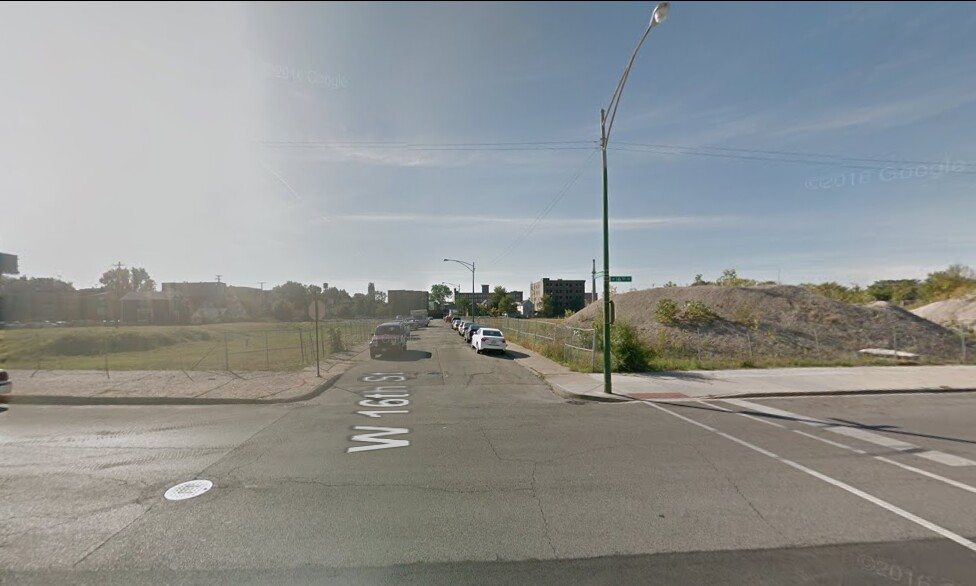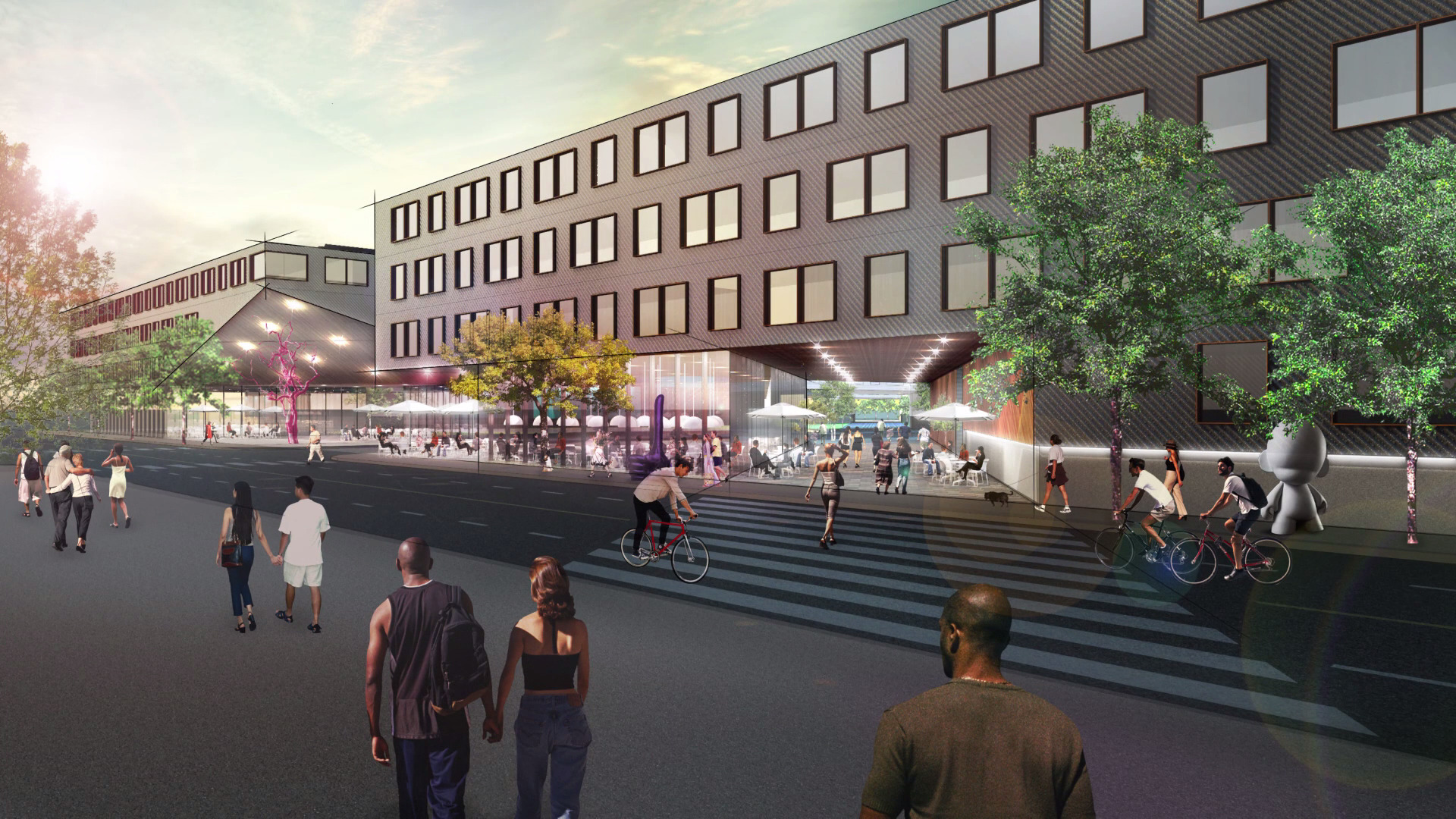The fight against gentrification in Chicago has really heated up in the last couple of years – or maybe it’s always been a hot topic and I just never paid attention to it before. The two neighborhoods where the debate seems to be the hottest right now is Pilsen and West Bucktown (I actually hate that phony name but enough people are using it now that I guess it’s the easiest way to reference it.) But in my mind there is no debate. Trying to stop gentrification makes no sense and is a futile effort – like trying to fight gravity.
In Pilsen alderman Danny Solis has been fighting hard for years to preserve the spectacularly beautiful vacant lots shown in the photo below just south of 16th St around Peoria. Thus far he has been enormously successful in killing every single proposal that a developer has put forth to turn this into unsightly housing, retail space and jobs that nobody in Chicago or Pilsen could possibly want. Solis’ main weapons have been zoning changes and a requirement that large developments include 21% affordable housing units. Because 0 affordable housing is better than something less than 21%, right?
The most recent attempt at developing this land is the ParkWorks residential and commercial project which has been proposed by the evil Property Markets Group. As you can see in the rendering I captured below from their promotional video this hideous project can’t possibly compare to the natural beauty of the current vacant lots.
OK. Enough of the sarcasm. In all fairness we don’t know where Solis is going to come out on this particular proposal yet but according to dnainfo he rejected a previous proposal from Property Markets Group due to the affordable housing requirement and the density considerations. We apparently don’t yet know where the current proposal stands in those regards but I’m sure this is a negotiation.
“I’m not going to rezone it for them to do a residential development, not without concessions,” Solis said. “It’s probably the biggest space now that’s available in all of Pilsen, and I want to make sure that we do something exceptional there, not just allow a developer to build a bunch of units there, make money and leave.”
Then there is all the development in West Bucktown (I cringe every time I say it) which alderman Roberto Maldonado is trying to “slow down” after having personally profited from it himself to the tune of $300,000. According to Crain’s he and alderman Proco Joe Moreno (my alderman who I actually like) have proposed “The Pilot Act for the Preservation of Affordable Housing in the 606 Residential Area [which] would impose high fees for demolition and new construction in an area of about 2.5 square miles bounded by Western and Kostner avenues east and west, and by Palmer and Hirsch streets to the north and south.”
What kind of fees are we talking about? According to Crain’s $300,000 to tear down a single family home and $450,000 to tear down a 2 flat. “Alternately, builders could designate half the units they build as affordable housing.” I’ll let that sink in a bit.
Frankly, I don’t trust these aldermen that fight gentrification. After all they are politicians and I suspect that they have ulterior motives. For instance, don’t you think that a sudden influx of new residents with a different demographic makeup might threaten the re-election of these guys? What better way to secure their re-election than to keep everything the same?
The Problem With Anti-Gentrification Efforts
I can understand why long term renters would oppose gentrification: rents will go up. And for homeowners property taxes will go up. But this issue is much more complex than people would like it to be and powerful laws of economics are at work here. Frankly, politicians can no more legislate this “problem” away than they can legislate gravity away.
Actually, before I get into all the issues…there is one aspect to this problem that politicians can legislate away without killing off development: property tax increases. It really does suck that someone buys a home and then over time their assessed value goes up, which drives up their property taxes. They didn’t bargain for that when they bought their home and they shouldn’t be forced to sell to get out from under that burden.
A simple solution would be to base property taxes off the purchase price and not the current assessed value. That would require higher tax rates in general and would put more of a tax burden on recent home buyers than older home buyers but at least people would know exactly what they are getting into for the long haul when they buy a home. Ironically that would probably cause people to stay put longer and kill the real estate business but so what? Homeowners would definitely be more invested in their neighborhoods if they knew they were going to want to stay there longer.
But on to the other issues around gentrification, all of which pretty much come down to basic economic principles. Politicians might be able to grasp these concepts better if they were required to pass an entry level college economics class with a B or better before serving in public office.
Housing Is Often Affordable Only Because Of Undesirable Attributes
When people talk about existing affordable housing there is a tendency to glorify what currently exists – as if it’s a bargain compared to what surrounds it. In reality there are no bargains. Usually there are clear reasons why an area might be “affordable”. Let’s face it there are immutable laws of real estate that dictate that the value of real estate is a function of supply and demand drivers such as condition, nearby amenities, commute times, and crime.
I can’t think of a low cost area in Chicago that isn’t lacking in one or more of those areas and oddly enough much of the anti-gentrification movement is focused on preventing basic neighborhood improvements such as the entry of more restaurants and coffee shops. Similarly, tearing down dilapidated buildings or rehabbing them is apparently less desirable than allowing people to continue living in them – usually with flagrant building code violations. I’ve been in a building with a guy affordably living in an unfinished basement.
Stopping Gentrification Makes Housing More Expensive
Half the price equation is supply so restricting the supply of new/ rehabbed homes can only lead to higher prices somewhere in the city for some group of people. There is no free lunch here. The reason that areas like West Bucktown are gentrifying is because it’s hard for people to find decent homes under $1 MM east of Western. Prevent them from moving west and now you’ve created an affordability problem for people with a $700,000 budget.
Don’t believe me? Do a Google search on the relationship between development restrictions and housing affordability. Here is just one paper on the subject from the Federal Reserve Bank of New York: The Impact Of Building Restrictions On Housing Affordability. From that paper: “The bulk of the evidence marshaled in this paper suggests that zoning, and other land-use controls, are more responsible for high prices where we see them.”
Building Affordable Housing Makes Other Housing More Expensive
Then there are the set aside requirements like in Pilsen where a developer has to include a certain percentage of affordable housing. But that requirement is not free to the developer and the developer is not going to just eat the cost. So either they walk away, which reduces the supply of housing and hence increases the cost of housing, or they increase the price of the market based units in their plan.
Gentrification Is Great For The Economy
What people seem to be missing in this debate is that gentrification is really good for the local economy. First, there are the obvious construction jobs created. Then there is the extra money brought into the community that gets spent at local businesses, followed by new businesses popping up. Since I moved to East Village 5 years ago I’ve seen the local businesses thrive and a host of new businesses opening up as money gets poured into the neighborhood every day.
In addition, when inexpensive homes get replaced by more expensive homes the city’s tax base increases which makes it a lot easier for Chicago to meet it’s escalating financial obligations.
Gentrification is Great For Long Time Homeowners
If we can get past the property tax problem, which I solved above, gentrification is really good for long time homeowners. If I were them I would cash out and go somewhere cheaper. In fact, that’s exactly what I’ll be doing when it’s time to retire. For example, in my own neighborhood the owner of the 2 flat at 1912 W Erie bought it for $130,000 back in 1992. Six years ago it wasn’t worth much more than $130,000 but three months ago they sold it for $555,000. That could be a life changing event for someone.
With all these forces at play the politicians and social activists can certainly slow gentrification down and generate a host of unintended consequences but they’re not going to stop it any more than they can stop gravity.
#Gentrification #Pilsen #Humboldt Park
Gary Lucido is the President of Lucid Realty, the Chicago area’s full service discount real estate brokerage. If you want to keep up to date on the Chicago real estate market, get an insider’s view of the seamy underbelly of the real estate industry, or you just think he’s the next Kurt Vonnegut you can Subscribe to Getting Real by Email using the form below. Please be sure to verify your email address when you receive the verification notice.

